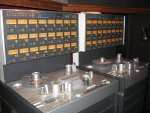I just went to a digital recording class at Guitar Center and everything the instructor said was great except for the following: he said that it's impossible to get sound wave clipping on a tape. When I laughingly said, "Well, I've gotten that plenty of times!", and he says, "No, that won't happen unless you're using a crappy tape recorder."
I've been using a Yamaha MT4X and a Tascam Portastudio 414 MKII 4-track recorder for the last ten years and they were definitely not crappy... they actually showed me when the input sound would clip, gave great recordings when they didn't clip (better than the later Tascam digital recorder I gave up) and had obvious distortion when they did clip. Before I knew what I was doing, people would notice the static and I had to make sure to find that happy medium with volumes.
I was confused that this guy who's supposedly been in the industry for 10 years (recording in LA with Slayer and Metallica) said something that completely contradicted my own experience and then saying I must be using a crappy tape recorder. I feel like he hasn't done much analog recording or was just offended that I contradicted him.
Has everything I've experienced been total delusion or is it actually possible to oversaturate a tape? As far as I'm concerned, if your input is clipped, it's going to record distorted to whatever medium you record to, no matter what.
I've been using a Yamaha MT4X and a Tascam Portastudio 414 MKII 4-track recorder for the last ten years and they were definitely not crappy... they actually showed me when the input sound would clip, gave great recordings when they didn't clip (better than the later Tascam digital recorder I gave up) and had obvious distortion when they did clip. Before I knew what I was doing, people would notice the static and I had to make sure to find that happy medium with volumes.
I was confused that this guy who's supposedly been in the industry for 10 years (recording in LA with Slayer and Metallica) said something that completely contradicted my own experience and then saying I must be using a crappy tape recorder. I feel like he hasn't done much analog recording or was just offended that I contradicted him.
Has everything I've experienced been total delusion or is it actually possible to oversaturate a tape? As far as I'm concerned, if your input is clipped, it's going to record distorted to whatever medium you record to, no matter what.


 ...aka - harmonic distortion.
...aka - harmonic distortion. 
